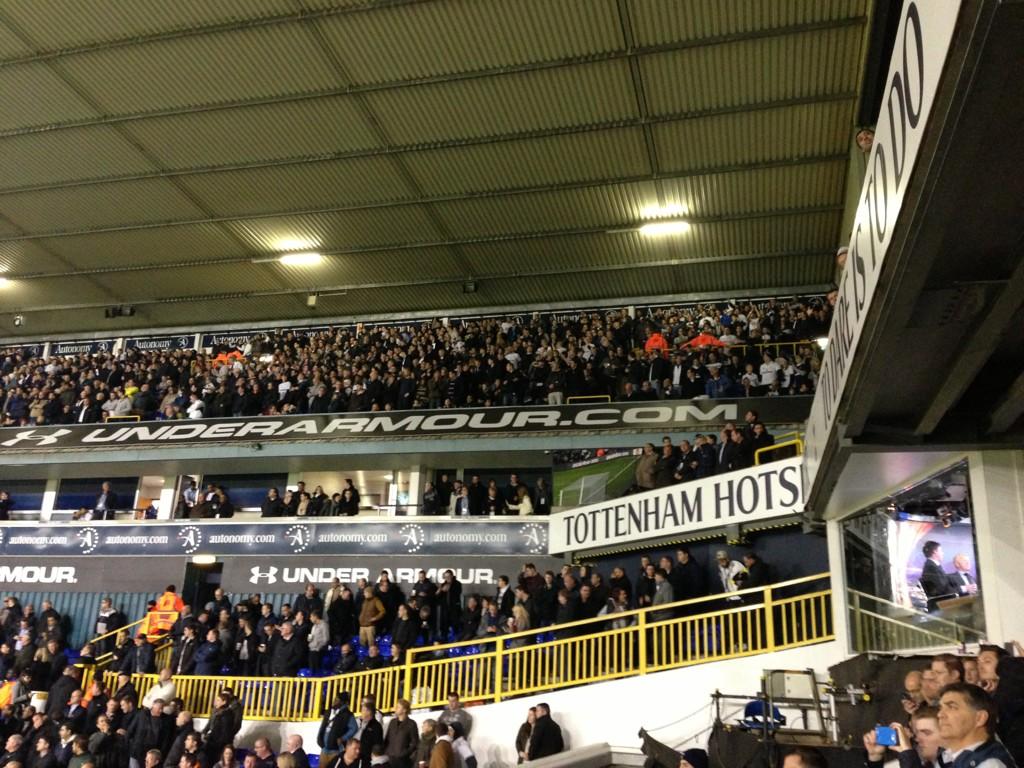After the game, the main complaints about the football was a wide judgement across the season.
- "Our football is too cautious. It shouldn't be based on possession, but on unrestricted swashbuckle."
- "Soldado doesn't get enough chances. He's only good for penalties."
- "This is not the attitude of a top four team."
The football could have been less cautious this season. We certainly have the players to be more attacking and have more bite to it. It's just a case of gathering the right eleven players for it, and that will come with time (that benefiting to a large squad). If we play unrestricted attacking football a la Redknapp, we abandon a fantastic defence (6 clean sheets in 9 games) and I doubt Spurs could last till May. A conundrum, but 'patience' is word of the day.
 |
| The 1882 Movement may be the answer to the dying atmosphere |
"Away from home their support has been amazing; we play with no fear and we need that atmosphere at White Hart Lane."
"We spoke about it at half-time. I told the players that we would have to do it on our own. They had to dig deep and look for the strength within themselves. They also believed that it's not easy to play in this stadium when the atmosphere is like this."
"We have a wonderful set of fans but they can do better."
To many Spurs fans (probably the ones inside the ground that day), this was a shocking statement. Their argument was that the team did nothing to get them going, that it was up to them to do their job and we cheer when they complete it, that forking out hundreds gives them the right to complain about it. If they have been quiet, it's because of AVB and the players.
The other camp to this argument supported AVB's verdict, not only supported, but knew it for many years. Their argument was that the Spurs fans have become too expectant, that the high ticket prices has brought in the wrong type of fan (I pay x-amount to watch this shit), that young, energetic fans have been skimmed out White Hart Lane due to the ticket prices. The argument was that White Hart Lane is just another product of modern football.
There's is no doubting that there is a massive atmosphere problem within the Lane. I remember Basel at home last season, where the silence of the Spurs fans was chilling, and the only voices that could be heard were Basel fans. It was no advert for White Hart Lane; it was not the way it should be.
If the atmosphere has become so negative that the players had to talk to the manager about it, then it seems clear that something has to change. The supporters don't do enough supporting. The fans are not fanatic enough. If you love your club, you have to do more than pay x-amount to show that. Paying £9 to watch Captain Phillips in the cinema doesn't make me a die-hard Tom Hanks fan. Paying £20 to watch Othello doesn't make you a Shakespeare ultra. You owe Tottenham Hotspur more than what you are giving them.
 |
| A 'fan', inside White Hart Lane, playing Candy Crush. Wow. |
The majority of fans have become spectators, theatre-goers who would rather criticise the performance than get behind the team. The energy these people have exercising criticism could easily be put into singing 'Oh When The Spurs' or any other song. Why has the players turned you cynical? I idolise them.
I have heard some horrific stories. Fans starting songs, only to get glaring looks from the people around. I've heard of people standing up together, only to be told to sit down and shut up by the overpowered stewards. I've even heard of people reporting other fans for swearing, resulting in a three-game ban for the 'guilty' fan. Does this sound like support to you?
Why have 90% of Tottenham fans become nihilistic? Why can't they go to the Lane, absorb in the moment and forget about negativity? Why can't they sing their hearts, show their colours, enjoy the moment? What good can criticism possibly achieve?
There are things the club need to do to help change the atmosphere, definitely. Reducing ticket prices, reducing steward and police presence, stop criminalising the fans and supporting safe-standing trials would all contribute towards an improved atmosphere. Outside of England, fans laugh at how stale we have become. Perhaps the 'product' is better, but what's the point if you can't enjoy it?
Football is not a product, and fans are not customers. You have a duty to your football club. Stop fearing the fans around you, join arms and sing for the shirt you claim to love. AVB has given you a message, and it's time to listen, time to learn:
Stand. Sing. Support.



